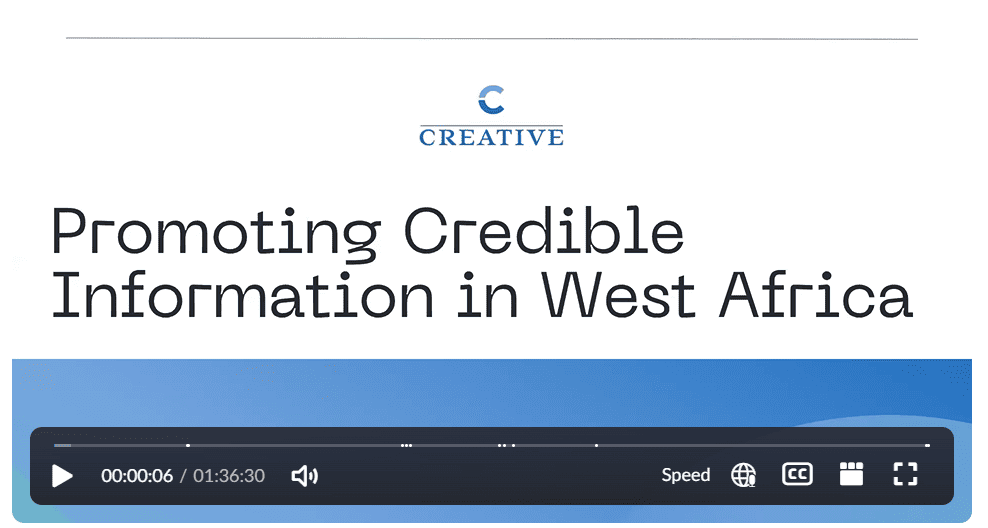As internet and social media use increases across West Africa, so does the prevalence of misinformation, disinformation and malinformation (MDM). The barrage of MDM in a region with a still burgeoning independent media, limited reliable news sources, high illiteracy and low digital literacy has curtailed social cohesion and had an outsized impact on democratic transitions.
The diversity of actors, strategies and tactics for MDM in West Africa make it hard to have a one-size-fits-all approach to combatting it.
Building on our programming experiences to combat MDM, Creative convened key players in the region to a virtual roundtable to discuss how they are addressing MDM and promoting credible information in West Africa.
Panelists included Meta’s Head of Misinformation Policy for Europe, Middle East and Africa, Tom Bonsundy-O’Bryan; Code for Africa’s CEO and Editor-in-Chief, Justin Arenstein; Mercy Corps’ Resilience and Conflicts Programs Director, Assaleh Ag Ousmane; and Creative’s Chief of Party for programs in Burkina Faso, Karl M. A. Jean-Louis.
Creative’s Manager of Addressing Information Disorder, Gabrielle Sigler, facilitated the roundtable.
MDM leads to conflict
Ousmane noted that MDM in Mali typically focuses on three categories: the country’s security crisis, the diversification of Mali’s partners (Russia/The Wagner Group vs. France/Western intentions and activities), and the country’s ongoing transition to elections. MDM’s effects in Mali can be felt at the community level where tensions are exacerbated and often lead to violent conflicts.
Disinformation is big business
Arenstein stressed that the disinformation business is lucrative, and there is a fast-growing economy for disinformation. He also noted that the most successful mis/disinformation campaigns do not create new information but instead focus on aggravating existing grievances to amplify tensions. Arenstein shared a new report from Atlantic Council about disinformation landscape in West Africa and beyond.
Mobilizing a network of global fact-checkers
To stop the spread of mis/disinformation, Bonsundy-O’Bryan highlighted that Meta does not see itself as an “arbiter of truth” and does not get involved in determining what is or is not true. Instead, it works with local fact-checking actors around the world. Meta’s MDM approach is to remove, reduce visibility and inform users. Instead of removing every piece of misinformation, Meta uses it as an opportunity to inform and build resilience.
Community collaboration
Jean-Louis showcased Creative’s work in Mali and Burkina Faso, highlighting the importance of working with local partners. Under its USAID Mali Peacebuilding, Stabilization and Reconciliation program, Creative implemented a vast public communication strategy aimed at all Malians to counter misinformation with credible and accurate information. Non-governmental and civil society organizations, youth activists and bloggers were mobilized to counter mis/disinformation. The strategy led to a positive trend in knowledge and information indicators. Creative is launching a similar campaign with local partners in Burkina Faso through the USAID Inclusive Governance for Resilience program.
Preventing the spread of MDM
The panelists’ recommendations to prevent mis/disinformation included:
- Train and mentor people (especially youth) on fact-checking
- Provide financial and technical support to local journalists and blogging associations on fact-checking
- Coordinate with other donors to maximize impact through multifaceted programs
- Engage with civil society organizations to increase resilience against the consumption of mis and disinformation
- Rely on local watchdogs (as opposed to international watchdogs who may not understand local grievances)
- Support continued research and increasing collaboration with local universities to share information among U.S. universities and local universities/stakeholders
- Support legislative reform
A reason for hope
While the effects of MDM can feel bleak, the panelists agreed there are reasons to remain hopeful. Bonsundy-O’Bryan has been encouraged by the development of the fact-checking ecosystem, Arenstein has seen civil society and governments grow in their understanding and approach to MDM, and Jean-Louis and Ousmane are heartened by the developments in Mali and the impact of Creative’s mis/disinformation campaign.
Aliya Jalloh is Creative’s Governance Project Director. She directs the Mali Peacebuilding, Stabilization and Reconciliation (PSR) and Reacting to Early Warning and Response Data in West Africa (REWARD) programs


